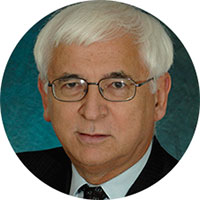Download PDF
WHAT’S HAPPENING
George B. Bartley, MD, Named Incoming CEO and Executive Director of the ABO

GEORGE B. BARTLEY, MD. Dr. Bartley has been named the next CEO of the ABO.
The American Board of Ophthalmology (ABO) has appointed George B. Bartley, MD, as CEO and executive director effective Jan. 1, 2017. Dr. Bartley will succeed retiring executive director John G. Clarkson, MD. Dr. Bartley said, “I am deeply honored to be selected for this role. It will be a privilege to work with the ABO’s dedicated examiners and volunteers, its outstanding staff, and its exceptionally committed Board of Directors to serve our patients and the public.”
Dr. Bartley is the editor-in-chief of Ophthalmology, the Academy’s flagship peer-reviewed journal, as well as the Louis and Evelyn Krueger Professor of Ophthalmology at the Mayo Clinic and CEO Emeritus of Mayo Clinic in Florida. David W. Parke II, MD, Academy CEO, said, “George has a great breadth of experience and is not afraid to challenge long-standing assumptions. He will combine the strengths of a visionary with a pragmatism nurtured by real-world leadership. I look forward to working with him.”
TAKE NOTICE
How to Determine Your Best Option for PQRS Reporting
Did you meet the Aug. 1 deadline for mapping your electronic health record data to the IRIS Registry? If you did, congratulations—you are implementing the least burdensome mechanism for PQRS reporting. If you didn’t, what are your alternatives? To find out, visit aao.org/pqrs-options. This webpage contains a step-by-step tool that will help you determine your option(s) for PQRS reporting.
PQRS: Sept. 30 Deadline for Cataracts Measures Group
What is at the top of your to-do list? If you are reporting the Cataracts Measures Group for the PQRS, your 5 most urgent tasks are as follows:
- Identify 20 surgical cases. Of those 20, at least 11 patients must have Medicare Part B insurance. The remaining patients may have Medicare Advantage or commercial insurance, or none. (Tip: In case any of your cases get rejected, you are encouraged to report more than 20 cases.)
- Provide patients with presurgical forms. Distribute them well before the day of surgery.
- Perform surgery. Only procedures performed on or before Sept. 30 can be used for reporting the Cataracts Measures Group in 2016.
- Provide patients with postsurgical forms within 90 days of surgery.
- Input all required details via the IRIS Registry Web portal by Jan. 15.
Although you have until Sept. 30 for the first 3 of those tasks, you are urged to get them done as soon as possible to allow for possible rescheduling or other changes that could affect reporting.
If you don’t perform cataract surgery—or if you missed the Aug. 1 deadline to sign up for the Cataracts Measures Group—the IRIS Registry Web portal provides 3 other options for PQRS: You can report the Diabetic Retinopathy Measures Group individual PQRS measures, or individual PQRS and/or non-PQRS measures. You must sign up with the IRIS Registry by Oct. 31.
Electronic health records (EHRs) are not required for reporting PQRS via the IRIS Registry Web portal. If you do have an EHR system, the easiest way to report PQRS is to integrate with the IRIS Registry, but this year’s deadline to sign up for that approach has passed.
For more information, visit aao.org/pqrs and aao.org/irisregistry.
FOR THE RECORD
Annual Business Meeting
Notice is hereby given that the Annual Business Meeting of the American Academy of Ophthalmology will be held Sunday, Oct. 16, 10:15-10:45 a.m., in North, Hall B of the McCormick Place Convention Center in Chicago.
Academy Election
The election for open positions on the Board of Trustees begins on Monday, Oct. 17, and closes after 30 days. Election materials will be sent to all voting Academy fellows and members. Results of the election will be posted on the Academy’s website by Nov. 18, 2016.
CANDIDATES’ VIEWS
Keith D. Carter, MD, FACS
Board of Trustees Nominee for President-Elect

Dr. Carter
Academic career: 28 years centered on education of trainees and practicing ophthalmologists. Resident program director for 16 years and chair of the Graduate Medical Education Committee for 4 years. Trained 140 residents and 21 fellows. Management of a clinically active oculoplastics and orbit practice. Chair of a major ophthalmology department for past 10 years.
Academy activities: Served as member-at-large of the American Academy of Ophthalmology Board of Trustees, the Academy’s representative to the National Medical Association, and a member of the Eye M.D. Residents’ Program Task Force. Graduate of the Leadership Development Program. Served on the Academy’s Ethics Committee, Committee for the Medically Underserved–Mentor Program, Self-Assessment Committee, Public Liaison Committee, Annual Meeting Program Committee, and Subcommittee for Ocular Tumors, Pathology, and Orbit, Lacrimal Plastic Surgery. Served as an editor for Focal Points.
Commitment: I am committed to advancing our membership and profession’s goals by advocating for excellent eye care and patient safety.
Robert E. Wiggins Jr., MD, MHA
Board of Trustees Nominee for Senior Secretary for Ophthalmic Practice

Dr. Wiggins
Given the multitude of forces that will be impacting ophthalmic practices in the coming years, I am excited about the opportunity to continue to lead the Academy’s efforts to assist ophthalmologists and their administrators in addressing these challenges. My qualifications for this position include:
Formal education in business management: 3-year program resulting in a Master of Healthcare Administration degree in 2003 from the University of North Carolina at Chapel Hill.
Practice management experience: Managing partner of Asheville Eye Associates, a practice that includes the full spectrum of ophthalmologic subspecialties, optometrists, an optical dispensary, an ambulatory surgery center, and multiple practice locations, since 2000.
Professional organizational leadership experience: Participation on the boards of the Academy, the AAOE, the American Association for Pediatric Ophthalmology and Strabismus, and the Ophthalmic Mutual Insurance Company has broadened my exposure to leaders in the field and a range of practice management issues.
I appreciate your consideration and welcome the opportunity to serve a second term.
Maria M. Aaron, MD
Board of Trustees Nominee for Secretary for Annual Meeting

Dr. Aaron
Experience: I’ve served as the Associate Secretary of the Special Projects Committee of the Academy and received a Senior Achievement Award in 2015. After 14 years as Residency Program Director at Emory, I am stepping down to assume the position of Associate Dean of Graduate Medical Education and will be responsible for 100 residency programs and 1,200 residents.
Leadership: I received the Straatsma Award for Excellence in Resident Education (2010) and the ACGME Parker J. Palmer Courage to Teach Award (2011). I’ve served on the Residency Review Committee for Ophthalmology of the ACGME from January 2007 to 2012 (Vice-Chair, 2010-2012) and have been an Associate Examiner for the ABO Oral Board Examination since 2005.
Passion: I am a natural leader, selfless mentor, and a compassionate physician with an unparalleled passion for education. I would be honored to serve our members as the Secretary for the Annual Meeting.
Sanjay D. Goel, MD
Board of Trustees Nominee for Trustee-at-Large

Dr. Goel
Strong background in advocacy for ophthalmology: I first testified on scope of practice expansion at the Maryland State House as a first-year ophthalmology resident. I also served as PAC chair and president of the Maryland Society of Eye Physicians and Surgeons. I completed the Academy’s Leadership Development Program (LDP IV) and served on its OphthPAC (5 years), State Affairs Committee (5 years), and Council (6 years).
Strong background in resident teaching: I lecture and mentor ophthalmology residents at the University of Maryland and helped create a refractive surgery training program for the residents at both the University of Maryland and Kennedy Krieger Eye Institute.
Goal: I am dedicated to promoting the profession of ophthalmology as we endeavor to deliver state-of-the-art eye care services in an efficient and cost-effective manner. The Academy is uniquely positioned to influence eye care delivery in the United States and around the world. The Board of Trustees is made stronger when the members are properly represented. I welcome the opportunity to be your voice in the room.
William F. Mieler, MD
Board of Trustees Nominee for Trustee-at-Large

Dr. Mieler
Clinical and research experience: Currently employed at the University of Illinois at Chicago, where I hold the Cless Family Professor of Ophthalmology professorship, and serve as vice-chair of Education and Academic Affairs. As a clinician-scientist, I am active in the practice of vitreoretinal diseases and ocular oncology.
Academy and ophthalmology experience: Served the Academy as the chairman of the Ophthalmic Knowledge Assessment Program Committee, worked on the Council, and served as the associate secretary for the Subspecialty Day programs (2010-2015). In 2011, I received the Life Achievement Award, and more recently, the Secretariat Award. I actively participate in the political aspects of ophthalmology. Outside of the Academy, I served as the chairman of the ABO and president of ARVO. I remain active in numerous international ophthalmic organizations.
Summary: I am honored to be nominated as a trustee-at-large, and I welcome the challenges of the position. I believe that my background has given me the perspective to understand the numerous educational, regulatory, and economic issues facing ophthalmology, and I will do everything possible to help represent and serve the membership regarding these ongoing issues.
For the full statements, visit aao.org/elections.
D.C. REPORT
The Academy Weighs In on MACRA
The Centers for Medicare & Medicaid Services (CMS) is preparing to overhaul how it pays physicians, and the Academy is informing the agency about how to make the program work for ophthalmology. CMS’ implementation of the Medicare Access and CHIP Reauthorization Act (MACRA) will consolidate existing federal reporting programs into a single program, the Merit-Based Incentive Payment System (MIPS). MIPS consists of 4 performance categories: quality performance, resource use, clinical practice improvement activities (CPIAs), and advancing care information (ACI) (see “MIPS Primer, Part 2—the Proposed Rules for Resource Use, ACI, and CPIAs”). MACRA impacts Medicare payments in 2019, and CMS has proposed 2017 as the base year for performance.
In June, the Academy submitted comments to CMS and cited a number of points that must be addressed in the agency’s final policy. One area of particular focus was ensuring that the Academy’s IRIS Registry is strongly positioned to support members. The Academy advised that CMS do the following:
Provide an even greater role for the IRIS Registry in the payment system. The IRIS Registry is well positioned to help ophthalmologists successfully report a number of MIPS requirements—but not all of them. The Academy wants the IRIS Registry and other clinical data registries to be certified for data collection in all reportable categories, thus reducing reporting burdens in all 4 MIPS performance categories.
Keep ophthalmology’s quality measures groups. CMS is providing flexibility by giving physicians partial credit when they report on quality performance measures. The Academy is asking the agency to expand this flexibility for ophthalmology by retaining the Cataracts Measures Group and the Diabetic Retinopathy Measures Group, both of which are reportable through the IRIS Registry.
Reward those CPIAs that are facilitated by IRIS Registry use. CMS will assign a weight to all activities in this category. The Academy is recommending that CMS assign a “high” designation to all activities related to the IRIS Registry. This will enable IRIS Registry participants to more easily achieve a high score.
Leverage the IRIS Registry in alternative payment models. The Academy is pushing for CMS to lead a discussion on how the IRIS Registry can help physicians meet MACRA’s alternative payment models pathway.